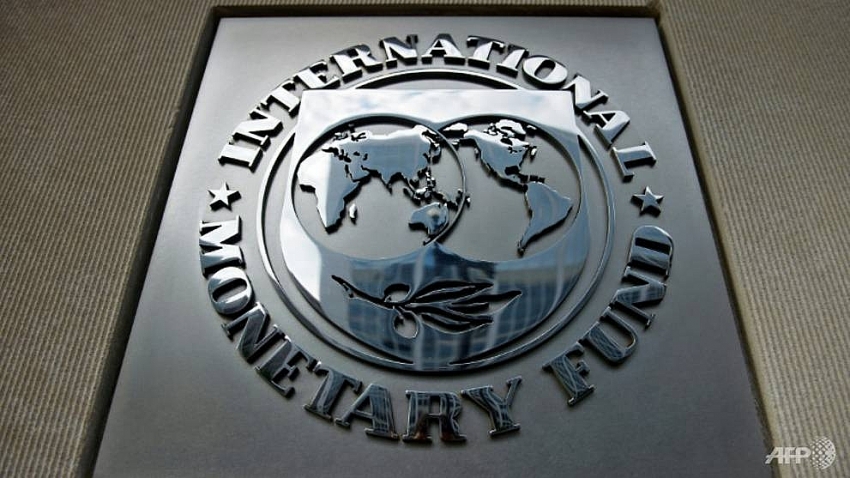'Window of opportunity narrowing' on global growth: IMF
 |
| The IMF has warned that 'everyone is going to suffer' from the US-China trade clash AFP/BRENDAN SMIALOWSKI |
US Treasury Secretary Steven Mnuchin had downplayed the global concerns expressed at an International Monetary Fund meeting held this week in Bali under the shadow of US-China tensions, saying the world would benefit if Beijing is forced to changes its trade policies.
But the IMF said in a communique that while global growth currently remained "steady", the risks are "increasingly skewed to the downside amid heightened trade tensions and ongoing geopolitical concerns".
The Fund kicked off its annual meeting with the World Bank on the Indonesian resort island earlier in the week in a gloomy mood, preoccupied by the trade tussle between the world's two biggest economies, and tightening financial conditions faced by emerging markets.
On Tuesday, it cut its outlook for global GDP growth by 0.2 percentage points to 3.7 percent for 2018 and 2019, citing the trade war.
"The window of opportunity (is) narrowing," the 189-country organisation said, adding that members would "refrain from competitive (currency) devaluations and will not target our exchange rates for competitive purposes" - a line apparently aimed at the US and China.
Mnuchin this week said he had told the head of China's central bank about his concerns over the weakness of its currency.
US President Donald Trump has accused Beijing of depreciating its currency to absorb the impact of US trade tariffs.
But Mnuchin, speaking on the Bali meeting's sidelines, declined to comment on whether Washington would declare Beijing a "currency manipulator" in a Treasury report due out next week.
That would be a first for China, triggering a process that could lead to punitive steps.
DIFFERING OPINIONS
Mnuchin also pushed back against the growing global angst over the US-China trade fight, saying that pressuring Beijing into adopting more open trade policies would be good for all.
"Our objective with China is very clear: it's to have a more balanced trading relationship," he said.
"I think that if we are successful, this is very good for US companies, US workers, Europeans, Japan, all of our other allies, and good for China."
The argument gained little traction in Bali on Saturday.
"Trade conflict would be bad for all economies, not just the US and China," Japanese central bank governor Haruhiko Kuroda said.
"This type of thing will not be good for the US economy, the China economy, but also for the economies of Asia and the world."
Tensions have soared recently with Trump's administration rolling out billions of dollars in tariffs against China in a bid to tackle its trade deficit and rein in what Washington considers unacceptable Chinese trade practices.
Mnuchin said Washington's ultimate goal was a "free, fair and reciprocal relationship" with Beijing.
Attention has begun to turn toward hopes that Trump and Chinese President Xi Jinping could meet on the sidelines of the G-20 summit next month in Argentina and bury the hatchet with some sort of agreement.
Mnuchin said no decision had been made yet and the US was not - "for the moment" - requiring any Chinese concessions before Trump agrees to a meeting.
"To the extent that we can make progress toward a meeting, I would encourage that and that's something we are having discussions about," he told reporters.
World markets also have been roiled by a plunge in some emerging market currencies - including Turkey and Argentina -- as domestic financial crises and higher US interest rates lure returns-hungry investors to the dollar.
The IMF statement said it would push to improve the World Trade Organisation and boost confidence in the global trading system.
It added that it would continue to help countries deal with the social and economic costs of "pandemics, cyber risks, climate change and natural disasters, energy scarcity, conflicts, migration, and refugee and other humanitarian crises".
What the stars mean:
★ Poor ★ ★ Promising ★★★ Good ★★★★ Very good ★★★★★ Exceptional
Related Contents
Latest News
More News
- Foreign fruits flood Vietnamese market (December 09, 2025 | 13:22)
- Vietnam’s fruit and vegetable exports reach $7.8 billion in first 11 months (December 05, 2025 | 13:50)
- Vietnam shapes next-generation carbon market (November 26, 2025 | 15:33)
- PM urges Ho Chi Minh City to innovate and remain Vietnam’s economic locomotive (November 26, 2025 | 15:29)
- Experts chart Vietnam's digital finance path: high hopes, high stakes (November 14, 2025 | 10:56)
- Vietnam’s seafood imports surge 30 per cent in first 10 months (November 10, 2025 | 19:35)
- Vietnam’s durian exports hit $1 billion milestone (October 30, 2025 | 17:41)
- Beyond borders: Sunhouse and new era of Vietnamese brands on Amazon (October 28, 2025 | 10:46)
- Record-breaking trade fair set to open in Hanoi (October 15, 2025 | 15:59)
- Timber sector seeks solutions to VAT refunds (October 14, 2025 | 18:58)

 Tag:
Tag:




















 Mobile Version
Mobile Version